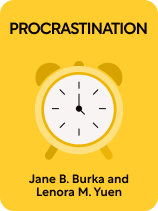

This article is an excerpt from the Shortform book guide to "Procrastination" by Jane B. Burka and Lenora M. Yuen. Shortform has the world's best summaries and analyses of books you should be reading.
Like this article? Sign up for a free trial here.
What causes procrastination? Is procrastination a time management issue? What are some solutions for procrastination that actually work?
Procrastination is often the result of poor time management, which is, in turn, the result of being out of sync with the passage of time. In other words, you procrastinate because your time perception is warped, which makes you underestimate how long tasks take.
Here are three behaviors that can empower you to make the most of your time and put an end to procrastination.
Time Is Finite—But You Can Learn to Make the Most of It
Some people procrastinate because they fear time’s passage and consequently live in denial of their limited time. Accepting time’s limitations, rather than resisting them, compels you to make the most of your time instead of procrastinating.
(Shortform note: Unlike Burka and Yuen, some experts claim that procrastination is purely an issue with how you manage your emotions—not an issue with how you manage your time. They claim that the best solution for procrastination is to learn to regulate your emotions in healthier ways. Burka and Yuen treat time management and emotional management as less of a binary. They acknowledge that learning to better manage your time can help with some of the emotional issues behind procrastination, such as the fear of restrictions and our tendency to prioritize our short-term emotional relief over long-term well-being.)
Behavior 1: Develop a Realistic Sense of Time
First, the authors argue that you can build your capacity to work within time’s constraints by developing a realistic sense of how time flows. One strategy for this is estimating tasks’ duration. Before you begin a task, predict how long it will take you. After you’re done, reflect on the difference between your prediction and reality. This exercise will develop your ability to set realistic expectations for how long a task will take, which will make tasks seem less daunting.
(Shortform note: Why do people have trouble accurately estimating time’s passage? According to experts, we tend to underestimate the duration of future tasks because we possess an optimism bias. Due to this bias, we base our predictions for tasks’ duration on positive past experiences more than negative ones, and we’re optimistic that we’ll perform better in the future than we did in the past. According to experts, you can compensate for your optimism bias when planning tasks by separating long-term projects into several, shorter mini-projects. This works because we tend to be more accurate when estimating the duration of shorter time intervals.)
Behavior 2: Make the Most of Short Periods of Time
According to the authors, you can also work with time’s constraints by making the most of short bursts of time. Procrastinators often wait until they have large blocks of time to work on something. As they delay the task, their fears grow, making it likely they’ll continue avoiding it.
Resist this tendency by making the most of brief periods of time (as short as one minute). For example, imagine you’ve been procrastinating on tidying your home. The next time you’re microwaving a meal, use those several minutes to tidy your kitchen.
When you spend even just one minute on a task you’ve been delaying, the task seems more approachable. This is because the fear and dread you experience when anticipating a task is usually an exaggeration. Once you begin a task, you realize it’s less daunting than you originally envisioned, making you less likely to avoid it.
(Shortform note: You may be tempted to use short bursts of time to engage in distractions (such as checking Instagram) rather than chip away at a task you’ve been avoiding. In Indistractible, Nir Eyal provides reassurance that your desire for distraction usually passes soon after it arises. Even when you feel tempted to engage in a distraction during a short burst of time, commit to just getting started on a task you’ve been avoiding. You’ll become immersed in that task, and your desire for distraction will soon dissipate.)
Behavior 3: Prioritize Life’s Most Fulfilling Tasks
Finally, the authors argue that prioritizing important tasks will reduce your procrastination and lead you toward a more fulfilling life. People tend to procrastinate by avoiding important tasks (such as getting enough sleep) and wasting time on less impactful tasks (such as mindlessly flipping through others’ profile pictures). By clarifying in advance what you believe to be important and unimportant, you’re more likely to catch yourself when you’re procrastinating with less important tasks. The authors provide guidance on which tasks to prioritize and avoid:
What to prioritize: Spend time on tasks that build social connections, offer opportunities for personal growth, and support your physical and mental health. These tasks build your self-esteem (which reduces your tendency to procrastinate) and give you the energy to tackle challenging tasks.
(Shortform note: You may find that you have too many appealing options for the healthy commitments Burka and Yuen describe. How do you choose which healthy opportunities to commit to? In Four Thousand Weeks, Oliver Burkeman recommends you take a two-for-one approach by combining social opportunities with other commitments. That way, you’ll simultaneously meet your need for social engagement and your personal needs. For instance, if you want to begin meditating to support your mental health, consider joining a meditation group instead of meditating solo.)
What to avoid: Avoid behaviors that are unhealthy (such as excessive partying), avoid people who harm your self-esteem, and cut back on behaviors that distract you and inundate you with information (such as watching too many videos on social media).
(Shortform note: Avoiding unhealthy behaviors is often easier said than done, since many of these behaviors are enticing. One expert on procrastination recommends you avoid unhealthy, enticing tasks by making them harder to access. For instance, if you’re often tempted to procrastinate on work by spending time on TikTok, place your phone high on a shelf in another room before you begin your work. The annoying effort of needing to grab a chair to access your phone again might make this temptation less appealing.)

———End of Preview———
Like what you just read? Read the rest of the world's best book summary and analysis of Jane B. Burka and Lenora M. Yuen's "Procrastination" at Shortform.
Here's what you'll find in our full Procrastination summary:
- How to identify the fears that lead you to procrastinate
- How your biology, circumstances, and self-esteem affect your procrastination
- How to better control how you manage your emotions and time






